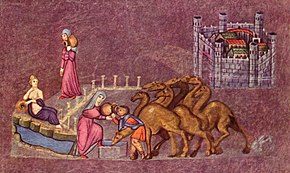Rebecca
![]()
This article is about the biblical person Rebekah. For general information on the given name, see Rebecca, for other meanings see Rebecca (disambiguation).
Rebekah (Hebrew רִבְקָה Rivkah; also Rebecca) is a biblical person of the Jewish Torah in the Tanakh and the Christian Old Testament.
The events around Rebekah are connected with the narratives of the progenitors in Genesis 24-27 EU. Rebekah is the sister of Laban, daughter of Bethuel the Aramean (Bethuel; genealogy in Gen 22:23 EU; 24:24-47 EU) and granddaughter of Milcah and Nahor (Abraham's brother who remained in Mesopotamia). She is the great-niece of Abraham, the cousin and wife of Isaac, the son of Abraham, and mother of the twins Esau and Jacob.
Etymology
The meaning of the Hebrew name is disputed. Nestle traces the name to the Hebrew phrase רב קוה ("great patience", "great expectation"). Already in Philo the person of Rebekah embodies patience and virtue. Johann Jakob Stamm interprets Rivqāh as a by-form of biqrāh, which is due to the Arabic baqarat ("cow"). Similar animal names are also found in Leah or Rachel. Uncertain are interpretations of Arabic rabkatun ("noose") or a connection with the New Hebrew word רבקה ("coupling"), which is supposed to symbolize the connection of the peoples of Israel and Edom.
Biblical narratives - Literary figure
In Gen 24 EU we are told how the aged Abraham sends his servant (presumably Eliezer, Gen 15,2 EU) back to the land of his kin (meaning the city of Harran in Syria, today Turkey) to find a godly wife for his son Isaac, because he does not want his son to marry a woman from Canaan, where pagan gods are worshipped. On his late afternoon arrival in Haran, the servant is camped at a well outside the city when the women come out to fetch water. Among them is Rebekah. The servant asks her for a drink of water from her pitcher, whereupon she also gives his camels a drink. This is the sign for the servant that Rebekah is the right woman for Isaac, because in a prayer he had previously turned to YHWH with the request that the woman destined for Isaac should behave in this way (Gen 24:14 EU).
At the house of Laban, Rebekah's brother, the servant announces his mission, presents valuable gifts from his master, and asks for Rebekah's hand for Isaac, which is granted. Rebekah also agrees to the decision and follows Abraham's servant to Canaan. Along the way she is accompanied by her nanny Deborah (Hebrew דְּבוֹרָה, dəvorah), who later became part of Jacob's household and died at Bethel (Gen 35:8 EU), as well as several servant girls (Gen 24:61 EU). In the new home she becomes the wife of Isaac, then forty years old, who becomes fond of her (Gen 25:20 EU). For many years the marriage remains childless because of Rebekah's infertility. Only after years of Isaac's fervent prayer does YHWH allow her to conceive (Gen 25:21 EU). When Rebekah gives birth to twins, her husband Isaac is already sixty years old (Gen 25:26 EU).
Gen 25:25-26 EU tells how the birth of the twins Esau and Jacob takes place. The unusual thing in Gen 25,22-23 EU is that Rebekka speaks directly to YHWH and receives from him the promise of a great offspring. In a dream God prophesies to her that the older Esau will have to serve the younger Jacob. This prefigures the future of the peoples descended from both (Gen 25:23 EU). From Esau derives the people of Edom, from Jacob the twelve tribes of Israel.
In Gen 26 EU the motive of endangering the ancestress appears, which is already found in Abraham and Sarah. Isaac denies the marriage with Rebekah in Gerar (Philistine city) and passes her off as his sister, because he is afraid of being killed for her sake (because of her beauty). The deception is discovered when Abimelech, the king of the Philistines, observes through the window how the two interact. Abimelech, against all expectations, places Isaac and Rebekah under special protection (Gen 26:1-11 EU). Later there is even a covenant between the two.
In Gen 27 EU, as in Gen 24 EU, Rebekah is presented as a very active woman. She helps her younger son Jacob with a ruse to obtain the blessing of the firstborn from his father by pretending to be his brother Esau. She violates the law, but on the other hand tries to fulfill the promise of YHWH in Gen 25.

Eliezer and Rebekka (Viennese Genesis, Syria, 6th century)
Search within the encyclopedia